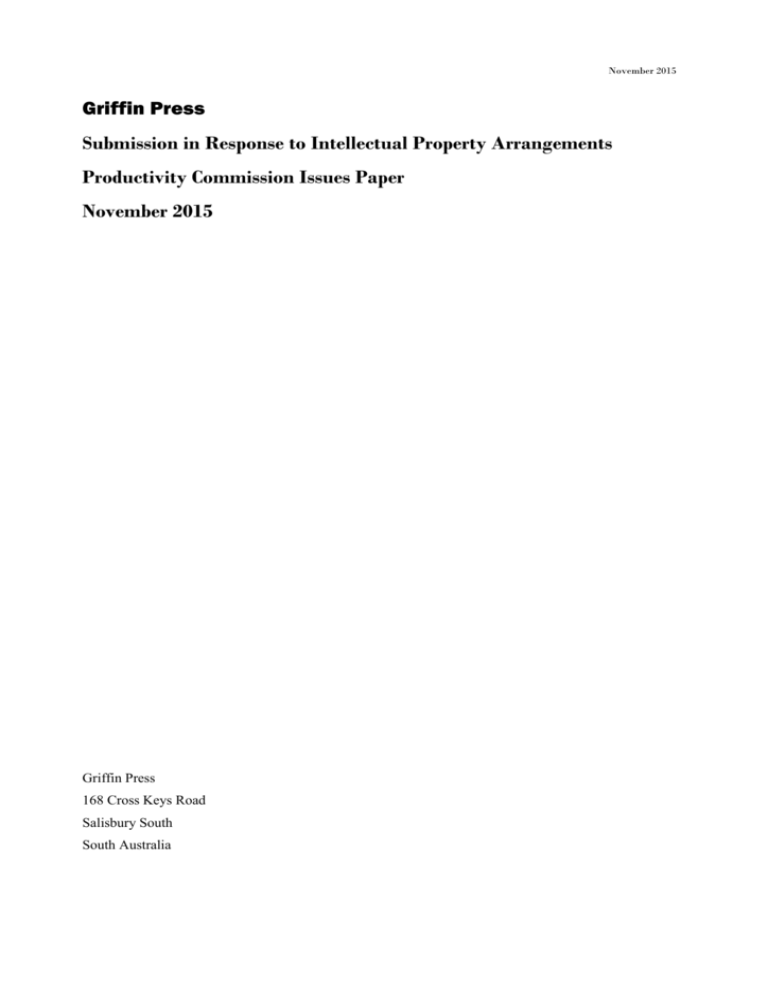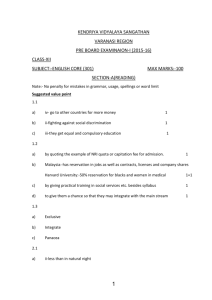Submission 49 - Griffin Press - Intellectual Property Arrangements
advertisement

November 2015 Griffin Press Submission in Response to Intellectual Property Arrangements Productivity Commission Issues Paper November 2015 Griffin Press 168 Cross Keys Road Salisbury South South Australia Summary Griffin Press is one of Australia’s major book printers having operated since 1858. Griffin Press’ submission focuses specifically on the following question: “Do existing restrictions on parallel imports still fulfil their intended goals in the digital era” Australia’s book industry has become a thriving, creative and competitive industry since the introduction of the 1991 parallel importation rules. More so now than ever before. The consumer has huge choice on where to purchase be it through local or global retailers. Locally produced, the range of titles and availability is bigger than ever due to the development of Griffin Press’ own, world leading, digital printing technologies. These deliver short run printing and enable print runs as little as 1 copy to be produced quickly and efficiently to demand. A competitive landscape exists and it is delivering the consumer value and choice. 59% of Griffin Press’ production is for Local Australian Publishing Houses. 41% of our production is for international subsidiaries, producing books for the Australian Market. As a result and because of the 1991 changes to the Copyright Act, Griffin Press has been able to, and continues to invest heavily in global best practice equipment and employee training to lift its competitiveness in a global market. This investment would not be able to be recouped if the rules were abolished. In Griffin Press’ view, the domestic printing of books (as a consequence of the parallel import copyright restrictions) has not translated into higher prices for books, nor reduced availability. In Griffin Press’ view, abolishing the parallel importation rule will most likely result in: a reduction in Australian book printing volumes; A reduction in local Australian Book Publishing the closure of Griffin Press’ entire business, with the loss of more than 108 South Australian jobs; significant financial impact on, or closure of, various specialist businesses who supply Griffin Press and others in the domestic book printing industry; and the demise of the Australian book printing industry. History and Capabilities Griffin Press was established in Adelaide in 1858 and has a long been a major Book Printer in Australia. In 1991 Griffin Press became part of PMP Limited, the leading print media production business in Australia, with operations focused on printing, distribution, digital graphic arts and micro-marketing. As part of a multi-million dollar upgrade, specifically in book printing capability, Griffin Press moved to Salisbury South in 2006. Griffin Press’ business employs 108 skilled people plus seasonal temporary labour as required. Over the last 16 years, it has trained 64 apprentices and trainees. Griffin Press also has sales offices in, Melbourne and London. Griffin Press’s Annual Turnover is $36.0 million Griffin Press prints for Australian, New Zealand and the United Kingdom based publishers for the domestic market. Usually, printed product is delivered to Australia and NZ destinations for domestic sale. Production and sale of this locally produced product attracts GST. Griffin Press only prints books, black text with colour covers. Last financial year, it produced approximately 24 million books, in 37,000 separate printings. It operates two dedicated mono book manufacturing presses, a sheet fed cover printing press, three state of the art digital presses and three high speed binding lines. Due to the printing volume available, Griffin Press is capable of running a highly efficient and internationally competitive book printing business, through such measures as: a prototype digital short-run book factory (with a roll of paper feeding in one end and a fully trimmed and finished book emerging at the other), being the first of its configuration in Australia; and The installation of the world’s first official HP T260 digital inkjet book production press in 2014 Installation of Australia’s First, HP T 350 Inkjet book production press in2011; and global best practice and ‘world first’ materials handling systems, through its capital investment in items such as its stacking equipment; Griffin Press is ISO 9001, FSC and PEFC certified, Environmental ISO 14001 certified. Investment In the last 8 years, Griffin Press has invested more than $21m in new equipment, and is an early adopter of new technology. This technology has ensured viable short run printing in Australia, increasing the range of books available to the consumer and reducing the lead times it takes to manufacture. Book printing is a niche market in Australia. To produce and deliver an internationally- competitive book, our publishers require a high level of manufacturing efficiency. This has encouraged Griffin Press to invest in highly specialised equipment. If book printing activity was to decline in Australia, this equipment cannot be repurposed for general print industry work, and would need to be decommissioned or sold internationally. Impact of 1991 changes The growth of book printing at Griffin Press flowed directly from the introduction of the 30/90 day rules in 1991 and further more by the voluntary adoption of the 14 day code of conduct. UK publishers started to use Griffin Press to comply with the 30-day rule. They soon found that printing in Australia produced other supply chain benefits. These included reduced stock write-offs and faster availability of reprints to meet retail demand, which helped their sell-through, improved profitability and ensured continuing availability for consumers. Some 41% of current production volume comes from print orders placed by UK publishers, primarily for new release titles. Significantly, about 60% of our business comes from reprints as publishers respond to consumer demand. Quite frequently, a new book will become an overnight and unexpected success. The publisher needs to replenish stocks to meet consumer demand as quickly as possible while the book’s star is riding high. For these reasons, Griffin Press’ ability to respond quickly and maintain high quality is vital to publishers and benefits consumers. Griffin Press is able to manufacture and deliver reprinted books to a publisher’s warehouse in as little as four days from order. Importantly, Griffin Press is only able to maintain such efficiencies if domestic book printing volumes are preserved. The loss of such ability may well reduce diversity of available book titles in the domestic market. The advent of e-books and digital content delivery platforms has further fuelled publishers to print locally with Griffin Press as they strive to offer competitive hard copy solutions to the consumer. Competitive from both a cost perspective and a time to market perspective. Impact of abolishing parallel import restrictions Griffin Press is in favour of maintaining the existing parallel import regime. Griffin Press makes the following submissions: the existing regime supports a vibrant domestic book printing industry; The exiting scheme supports to vibrant domestic book publishing sector – the who’s very core fabric surrounds copyright protection of the literary asset they have invested in ; The Existing scheme has delivered a well structured and well organised industry aimed at fulfilling consumer demand. Abolition of the regime will result in a fragmented disorganised supply chain abolition of the regime will inevitably lead to increased dumping of overseas editions of Australian and overseas books at the expense of the domestic book printing industry. If overseas publishers see an additional market for unsold books that they would otherwise have to pulp, they will use it; Large retailers will also use the availability of cheaper editions from anywhere in the world to increase their margins. As a consequence, they are likely to limit the range of books available as purchasing preference will be given to large volume books purchased as remainder stock; Overseas book printers may well not achieve the domestic quality, environmental and labour standards maintained by Australian printers and expected by the Australian consumer; Overseas books are often brought into Australia GST Free – don’t add to our value add to our economy, and often brought in by Australia Post at a significant cost impost due to the international postal treaty. It is likely that abolition of the regime will result in both a reduced range of books on sale in Australia and a reduction in supply consistency because of the increase in time and cost of the longer supply chain associated with sourcing books from overseas; Publishing of local Australian content will reduce due the decreased viability of local publishers. The decline of the Local publishing industry will over time lead to a decline in competition and availability for the consumer. Specific to Griffin Press, the abolition of the parallel import regime would create a massive disincentive to the printing in Australia of new overseas titles. This comprises 41% of Griffin Press’ business. If orders received by Griffin Press were reduced by as little as 25%, Griffin Press ceases to be viable, this in turn would mean: Griffin Press’s overall operations in South Australia cease to be viable; At least 108 South Australian jobs with Griffin Press would be lost, with a domino effect on major suppliers, especially Die Cutting and Creasing Services; and Norske Skog in Tasmania An end to Griffin Press’ personnel training program. Training young people in our industry. An increase to Australia’s carbon emissions due to increased importation of books. Griffin Press strongly urges the Competition Policy Review Panel to preserve the existing conditions which have allowed a valuable and vital industry to grow in Australia, while providing Australians with a very wide range of books at highly competitive prices. Conclusion Parallel import restrictions on books are as relevant and important now in this digital era as it has ever been. They diversity of literature, the creation and promotion of local literature, the local availability and the range of books available to the consumer, the price of books, The local Print industry, and foremost, the consumer reap all beneficiaries of the current competitive environment created by the existing parallel import regime.


